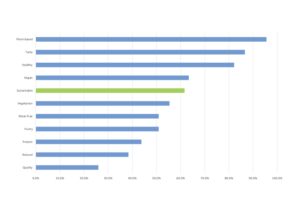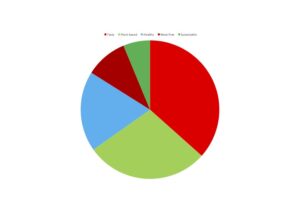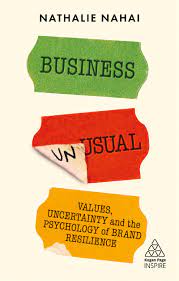
Plant-based foods are a fast-growing category with the potential to make an important contribution to more sustainable food consumption habits. Thailand is a big exporter of plant-based foods and there have been many new product and brand launches over the last two years.
As part of a broader project on the visual communication of sustainability, I looked at more than 100 products to understand the meanings being communicated by different brands (representing 30 individual brands) and whether sustainability was part of the marketing of the brands. The focus was on point-of-sale and packaging, but websites, social media, TV and YouTube were also part of the analysis. All of the products were sourced in Bangkok retail outlets and are summarised in Table 1.
Table 1: List of brands, product variants, brief description of product type, and country of origin (in alphabetical order)
| Brand name | Number of items | Description of products | Country of origin |
| Absolute Plant | 4 | Plant-based menu items | Thailand |
| Alpha | 1 | Plant-based nuggets | USA |
| Beyond Meat | 3 | Plant-based meat products | USA |
| Bird’s Eye Green Cuisine | 3 | Plant-based meat products | UK |
| Broccoli Revolution | 3 | Restaurant decor and menu | Thailand |
| First Pride | 4 | Plant-based menu items | USA |
| Fry’s | 7 | Plant-based meat products | UK |
| Harvest Gourmet (Nestle) | 4 | Plant-based meat products | Switzerland |
| Healthiful (Central Retail) | 4 | Plant-based ready meals | Thailand |
| Krop | 7 | Plant-based menu items | Thailand |
| Let’s Plant Meat | 7 | Plant-based meat products | Thailand |
| Linda McCartney’s | 1 | Vegetarian sausages | UK |
| Mantra | 5 | Plant-based meat products | Thailand |
| Meat Avatar | 4 | Plant-based meat products | Thailand |
| Meat Zero | 9 | Plant-based menu items | Thailand |
| Meatly (Betagro) | 3 | Plant-based meat products | Thailand |
| Meatoo | 2 | Plant-based ready meals | Thailand |
| MJ (Mudjai) | 6 | Mushroom-based menu items | Thailand |
| More Meat | 1 | Plant-based protein | Thailand |
| Morning Star Farms | 3 | Plant-based meat products | USA |
| Never Meat | 7 | Plant-based meat products | Thailand |
| NoMeat | 1 | Mushroom steaks | UK |
| OMG Meat | 3 | Plant-based menu items | Thailand |
| Omnimeat | 2 | Plant-based meat products | Canada |
| Plant Ever (Cargill) | 2 | Plant-based menu items | USA |
| Pranaa | 1 | Food delivery menu | Thailand |
| Quorn | 5 | Meat-free menu items | UK |
| So Good | 1 | Plant-based milk | Australia |
| Swees | 5 | Organic plant-based cheese | Thailand |
| V Farm | 4 | Plant-based menu items | UK |
The analysis looked for the overall themes as well as specific mentions of key terms, words and phrases along with visual cues (images, colours, icons, etc). The analysis was conducted for each individual item and not for the overall brands and were summarized by the frequency of occurrence.
Predictably, ‘plant-based’ was the most frequently communicated meaning (more than 95% of the products), followed by ‘tasty’ and ‘healthy’. ‘Vegan’ was more common than ‘vegetarian’ or ‘meat-free’ (63%, 55%, and 51%) with flexitarian only mentioned by two brands. The top ten themes are summarized in Table 2 and in the visual below.

Table 2: Key meanings (percentage of items)
| Meaning | Percentage of items |
| Plant-based | 96% |
| Tasty | 87% |
| Healthy | 82% |
| Vegan | 63% |
| Sustainable | 62% |
| Vegetarian | 55% |
| Meat-free | 51% |
| Purity | 51% |
| Protein | 44% |
| Natural | 43% |
The word ‘meat’ was invoked much more frequently than the word ‘plant’ in the naming of brands (11 vs 3), although ‘plant’ is very common in the description of individual product items. The majority of brand names are in English and latin script with a small number based on Thai or Sanskrit.
The most popular colour for products is green, used by 73% of brands and way ahead of any other colour. Other popular colours are white, brown, yellow and transparent.
‘Natural’ was less common as a theme than anticipated and only really invoked by green colours and by representations of leaves in the artwork on front of pack (often as part of the brand logo and name). Overall, the primary themes used by brands fall into five categories. The most common is ‘tasty’, followed by ‘plant-based’, ‘healthy’, ‘meat-free’ and ‘sustainable’ (the main theme of only two brands and 6% of items).

Overall, the conclusion is that sustainability is not a priority in the messaging of plant-based food products, which focus on taste (a category basic), health, and diet/identity. In the next article on this work, I will explore more on the implications of these findings for the marketing of plant-based foods and promotion of more sustainable diets and reduced meat consumption.






How do we encourage people to eat less meat? – TapestryWorks
[…] a recent article, I wrote about some of my recent research on plant-based food products available in Thailand. In […]